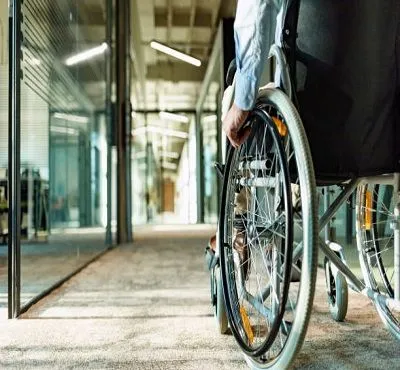We do not request reimbursement of costs
(such as repayment for obtaining medical records)
from veterans nor from people who suffer from multiple sclerosis.
- Call today for a free evaluation
- 1-888-774-7243
Disability For Epstein-Barr
Everyone feels ill and unable to work once in a while, but some people suffer from chronic conditions that make it impossible for them to work in the long term. These individuals may be eligible to receive social security disability (SSD) benefits. SSD is a type of insurance program maintained by the federal government. Workers pay into the program through paycheck deductions. Unlike other welfare benefits that are available to those in need, SSD is a benefit that applicants have paid for throughout their working lives.
What Is Epstein-Barr?
 Epstein-Barr is a virus that is part of the herpes family. Most people experience the virus at least once in their lives, but the duration and severity of symptoms varies. Children who are infected with Epstein-Barr often show no symptoms at all. Adults typically experience symptoms like fatigue, sore throat, fever, rash, enlarged spleen, swollen lymph nodes and swollen liver for up to a month.
Epstein-Barr is a virus that is part of the herpes family. Most people experience the virus at least once in their lives, but the duration and severity of symptoms varies. Children who are infected with Epstein-Barr often show no symptoms at all. Adults typically experience symptoms like fatigue, sore throat, fever, rash, enlarged spleen, swollen lymph nodes and swollen liver for up to a month.
Unfortunately, some people who are infected with Epstein-Barr experience chronic illness. People who have a compromised immune system are at greater risk of experiencing repeat bouts of illness with Epstein-Barr. Individuals who experience ongoing recurrences of symptoms may feel extremely fatigued for months.
Can You Get Disability For Epstein-Barr?
The problem with applying for disability benefits with Epstein-Barr is the fact that the virus tends to last only a few months. The Social Security Administration (SSA) requires applicants to have a disability that is expected to last a minimum of 12 months. People who feel fatigued, experience joint pain or have difficulty concentrating because of the infection may be worried that they will not be able to afford their basic necessities as they are unable to work.
While it is difficult to qualify for SSD benefits with Epstein-Barr, there are some exceptions. The SSA will start by evaluating medical records to determine whether it is likely that the disability will last at least 12 months. Diagnostic tests and symptoms are analyzed during this process. The applicant’s medical provider must provide an opinion on the severity and expected duration of the condition.
The SSA will also evaluate whether the applicant can be expected to find employment in any position for which the individual is qualified. Applicants are not allowed to earn more than $1,070 each month through work, and the scope of disability must be severe enough to make work tasks impossible to complete.
If the SSA determines that the applicant is unable to work due to disability, the evaluation moves on to matching up the condition with a recognized listing. Listings are disabilities and symptoms that are recognized by the SSA. However, Epstein-Barr is not a disability that has been identified in one of these listings.
A residual functional capacity assessment is used to determine whether the individual is able to perform job tasks. This medical evaluation pinpoints the limitations that are caused by symptoms of Epstein-Barr. If a person is not able to perform job tasks with reasonable accommodations, the application for benefits is likely to be approved.
Getting Help From an Attorney
Applying for SSD benefits is a confusing and tedious process. People who are not familiar with the SSA’s requirements for the application may find that they are denied benefits because of a lack of adequate evidence. Many people feel alone and scared while they are trying to apply for the benefits that they need to pay for housing and groceries.
An experienced disability lawyers in miami is able to provide guidance through the application process. People who hire an attorney feel that they have the support that they need to make it through this difficult time. Attorneys are able to provide advice and help clients gather medical evidence to increase the chances that an application will be approved.
To discuss SSD and SSI claims or appeals, please call (215) 464-7200 or contact our attorneys using the form below.
The initial consultation is free, and we never charge a fee until we win your case.
For a Free Evaluation
Monday : 9am–5pm
Tuesday : 9am–5pm
Wednesday : 9am–5pm
Thursday : 9am–5pm
Friday : 9am–5pm
Saturday : Closed
Sunday :Closed

